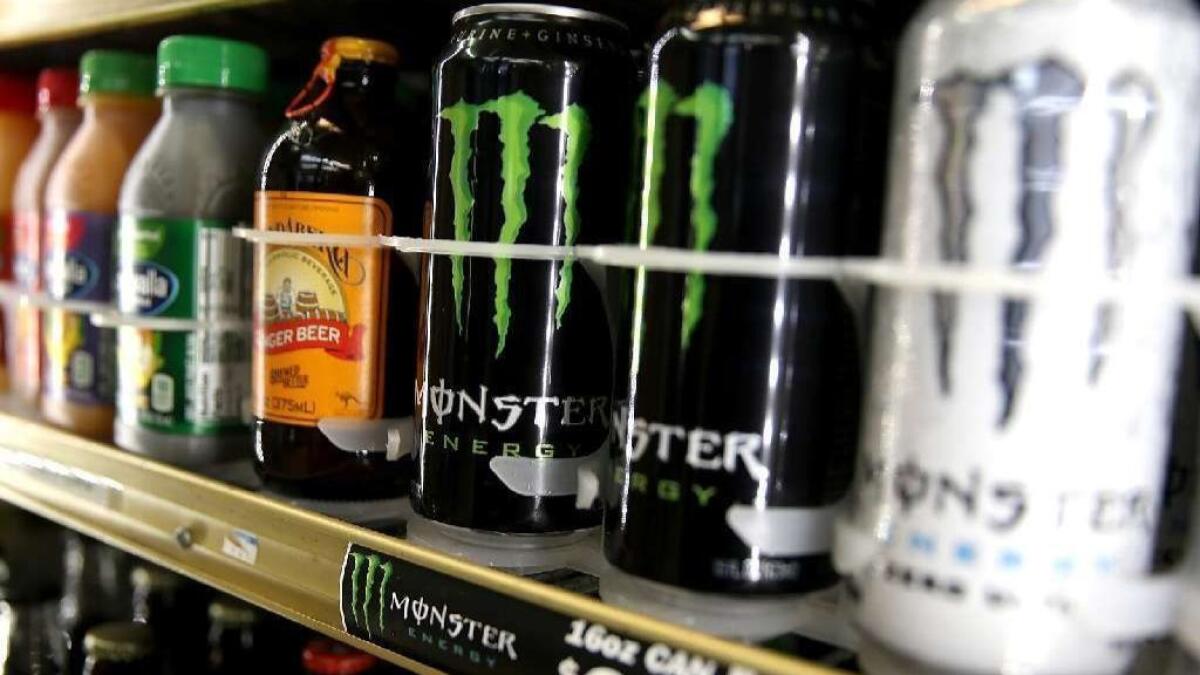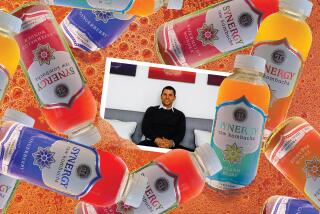Jury finds Monster Energy drink didn’t cause Texas man’s heart attack

A Riverside County jury has found that the maker of Monster Energy drinks was not responsible for a Texas man’s debilitating heart attack, the latest legal victory for the company, which has been the target of numerous product-liability lawsuits.
Cody Bledsoe sued Corona-based Monster Beverage Corp. in 2014, saying the company’s energy drink was responsible for a heart attack he suffered the year before when he was 18. The heart attack caused brain damage that Bledsoe’s attorneys said limits his ability to work and has led to high medical costs.
Monster has been hit with numerous similar lawsuits before, though this is the first time a case has gone all the way to a jury trial.
Others have been settled or, more often, dismissed. A Florida law firm in 2016 filed and later dropped more than a dozen cases against Monster. In October, a woman in Tacoma, Wash., dropped a 2017 lawsuit in which she alleged drinks from Monster and rival beverage maker Red Bull caused her husband’s death.
Marc Miles, an attorney for Monster, said the jury in the Bledsoe case deliberated for just 15 minutes before finding Thursday that the energy drink did not lead to Bledsoe’s heart attack.
“This is the first case of this type to ever go to verdict, and I am pleased the jury listened to the medical and scientific evidence and followed the law,” Miles said in a statement.
The company has argued in numerous cases that its products are safe, noting that they contain less caffeine than many other beverages. A 16-ounce Monster Energy drink contains 160 milligrams of caffeine, while a 16-ounce Starbucks coffee contains 310 milligrams, according to the nonprofit Center for Science in the Public Interest.
“People often don’t understand what’s in the drink, and they make assumptions,” Miles said in an interview. “When the science and the evidence come out, it’s clear.”
Bledsoe’s attorney, Greg Marks, said he plans to appeal the verdict. He said Riverside Superior Court Judge Sunshine Sykes did not permit him to use several studies that suggest energy drinks — although not Monster specifically — can cause irregular heart rhythms that lead to heart attacks.
“The judge excluded a lot of scientific studies,” Marks said. “That hamstrung us a little bit.”
Monster, now one of the largest makers of energy drinks, started in the 1930s as Hansen’s Juices, a Southern California fruit-juice distributor. The company, later called Hansen Natural, branched out into naturally flavored soft drinks and later energy drinks. The company, which is publicly traded, changed its name to Monster Beverage Corp. in 2012.
In 2015, Coca-Cola Co. took a minority stake in Monster and acquired the company’s non-energy drink business, including Hansen’s Natural sodas.
Monster is a major sponsor of adventure sports, backing athletes and events in mixed martial arts, snowboarding and motorcycle racing. Over the years, the company has faced allegations that it inappropriately markets its products to children and that its energy drinks cause heart problems.
The company noted in its annual report to the Securities and Exchange Commission that it has twice been subpoenaed by New York state regulators, who are investigating the company’s advertising and ingredients.
Follow me: @jrkoren
More to Read
Inside the business of entertainment
The Wide Shot brings you news, analysis and insights on everything from streaming wars to production — and what it all means for the future.
You may occasionally receive promotional content from the Los Angeles Times.











